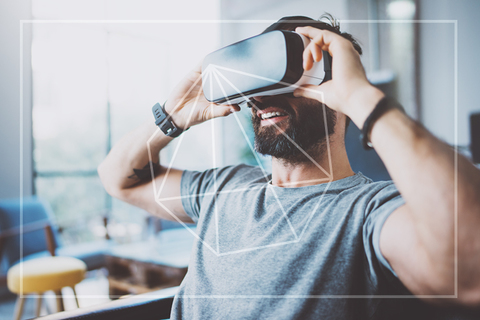07-05-2017
How Augmented Reality Can Augment Your Bottom Line

Dear House Rules,
Augmented reality. Virtual reality. Google glass. 3D animation. There seem to be so many new technologies out there now that I’m having a hard time keeping up. I want to recommend the best and most relevant tactics to my client – but I can’t do that unless I understand them myself. Let’s start with “augmented reality” – what is it, and what benefits does it offer?
Signed,
Need to go back to school on the latest tech
Dear Back to School,
You express a valid concern, and one we hear often. Let’s break it down: “augmented” is a form of its root word “augment,” which Merriam-Webster defines as “to make greater, larger, or more intense” and “to supplement.” “Reality,” of course, is self-explanatory. Put the two together, and you get “augmented reality (AR).” Merriam-Webster defines AR as “an enhanced version of reality created by the use of technology to overlay digital information on an image of something being viewed through a device (such as a smartphone camera).”
The most vivid example of the power of augmented reality is the ongoing worldwide fad-bordering-on-mania for the AR smartphone app “Pokemon Go.” In it, a small illustrated figure could appear on a certain section of the Trevi Fountain ledge, for example. Now imagine if, instead of cute, elfin, brightly colored figures, what was visible through your smartphone when you hold it up to your own arm was a blood vessel as plaque begins to form. Your audience could then watch as the plaque recedes as a certain medication is administered. That’s AR, and that’s how it can be used in healthcare. You can suggest that your clients use AR to:1
- Educate patients overwhelmed by text
- Impress doctors who’ve “seen it all”
- Teach sales reps how to deploy AR in the most effective way to gain access to tough-to-see doctors
Is AR Any Different from Virtual Reality?
Augmented reality differs from its close cousin, virtual reality (VR), in that the latter creates a 3D world that completely detaches the user from reality. VR is an immersive experience, whereas AR is not. This distinctive feature enables AR to become a driving force in the future of medicine.
Is AR Really Taking Off in the Healthcare Space?
For now, there are still several hurdles to be overcome before AR becomes commonplace in the healthcare setting. These obstacles are related to education, cultural change and acceptance, but any technical obstacles are temporary, and cost-related barriers will also disappear in the future. In fact, experts believe that AR will become more and more common in healthcare over the next 3-5 years.
At Xavier Creative House, our team of talented strategists and designers make sure to stay on top of all emerging marketing tactics. We’d love to partner with you to help you find the right marketing mix for your clients now – and in the future. Give us a call!
Sincerely,
House Rules
References: 1. http://medicalfuturist.com/augmented-reality-in-healthcare-will-be-revolutionary/. Accessed June 17, 2017.

